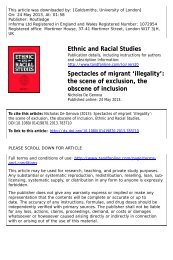migrant “illegality” and deportability in everyday life - Nicholas De ...
migrant “illegality” and deportability in everyday life - Nicholas De ...
migrant “illegality” and deportability in everyday life - Nicholas De ...
Create successful ePaper yourself
Turn your PDF publications into a flip-book with our unique Google optimized e-Paper software.
Annu. Rev. Anthropol. 2002.31:419-447. Downloaded from arjournals.annualreviews.org<br />
by Columbia University on 03/02/09. For personal use only.<br />
MIGRANT “ILLEGALITY” AND DEPORTABILITY 425<br />
of their appearance (Bonefeld 1994, 1995; Holloway 1995). That is, by treat<strong>in</strong>g<br />
the law as effectively def<strong>in</strong>itive, coherent, <strong>and</strong> complete, such perspectives tend to<br />
recapitulate the reification of the state’s authority <strong>and</strong> power, which the state itself<br />
propagates. On the contrary, the <strong>in</strong>tricate history of law-mak<strong>in</strong>g is dist<strong>in</strong>guished<br />
above all by the constitutive restlessness <strong>and</strong> relative <strong>in</strong>coherence of various strategies,<br />
tactics, <strong>and</strong> compromises that nation-states implement at particular historical<br />
moments, precisely to mediate the contradictions immanent <strong>in</strong> social crises <strong>and</strong><br />
political struggles, above all, around the subord<strong>in</strong>ation of labor (cf. Bonefeld 1994,<br />
1995; Holloway 1994, 1995). Thus, immigration laws serve as <strong>in</strong>struments to supply<br />
<strong>and</strong> ref<strong>in</strong>e the parameters of both discipl<strong>in</strong>e <strong>and</strong> coercion, but this is largely<br />
so through the deployment of those laws as tactics. By emphasiz<strong>in</strong>g this “tactical”<br />
character of the law, it is imperative to recall that tactics that aim to make a discipl<strong>in</strong>ed<br />
<strong>and</strong> manageable object of any given social group are conjunctural <strong>and</strong> can<br />
never be assured of the certa<strong>in</strong>ty of their realization. These tactics are ensnared <strong>in</strong><br />
a struggle to subord<strong>in</strong>ate the <strong>in</strong>tractability that is <strong>in</strong>tr<strong>in</strong>sic to the constitutive role of<br />
labor with<strong>in</strong> capital—what Marx described as “a protracted <strong>and</strong> more or less concealed<br />
civil war” (Marx 1976, p. 412 [1867]; cf. Bonefeld 1995, Holloway 1995).<br />
If we underst<strong>and</strong> the state to be a particularization of “the political”—which is to<br />
say, “the abstraction” [<strong>and</strong> separation] “of coercion from the immediate process of<br />
exploitation” (Holloway 1994, p. 31; cf. Pashukanis 1989, p. 143 [1929])—then it<br />
is useful here to underscore that labor plays such a constitutive role not only with<strong>in</strong><br />
capital but also with<strong>in</strong> the capitalist state itself. As Holloway writes, “Once the<br />
categories of thought are understood as expressions not of objectified social relations<br />
but of the struggle to objectify them, then a whole storm of unpredictability<br />
blows through them. Once it is understood that money, capital, the state ...” [<strong>and</strong><br />
here I would add, emphatically, the law] “ ...are noth<strong>in</strong>g but the struggle to form,<br />
to discipl<strong>in</strong>e, to structure what Hegel calls ‘the sheer unrest of <strong>life</strong>,’ then it is clear<br />
that their development can be understood only as practice, as undeterm<strong>in</strong>ed struggle”<br />
(Holloway 1995, p. 176). It is this appreciation of the law—as undeterm<strong>in</strong>ed<br />
struggle—that I want to br<strong>in</strong>g to bear on how we might apprehend the historicity<br />
of immigration law, especially as it has devised for its target those characteristically<br />
mobile social formations comprised by labor migrations, particularly the<br />
undocumented.<br />
One prom<strong>in</strong>ent formulation of the theoretical problem concern<strong>in</strong>g the productivity<br />
of the law, <strong>and</strong> the production of <strong>migrant</strong> <strong>“illegality”</strong> <strong>in</strong> particular, has been<br />
derived from Foucault’s analysis (1979) of modern power as productive, <strong>and</strong> specifically,<br />
from his discussion of “illegalities” <strong>and</strong> “the production of del<strong>in</strong>quency”<br />
(1979, pp. 257–92).<br />
Behdad (1998) advances a Foucauldean render<strong>in</strong>g of U.S.-Mexico border enforcement<br />
<strong>in</strong> terms of discipl<strong>in</strong>e, surveillance, <strong>and</strong> the production of del<strong>in</strong>quency—<br />
emphasiz<strong>in</strong>g the critical role that the <strong>“illegality”</strong> of the undocumented plays for<br />
discipl<strong>in</strong><strong>in</strong>g <strong>and</strong> other<strong>in</strong>g all noncitizens, <strong>and</strong> thus for perpetuat<strong>in</strong>g monolithic normative<br />
notions of national identity for citizens themselves. (Note that Behdad’s<br />
<strong>in</strong>vocation of the “del<strong>in</strong>quency” of the undocumented resonates with Bustamante’s





